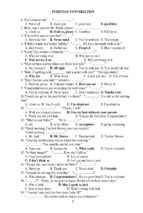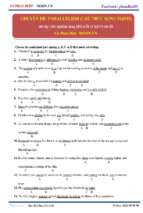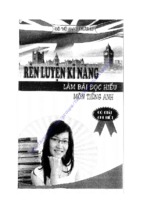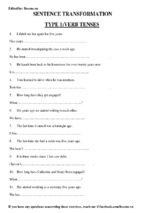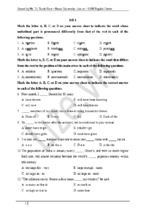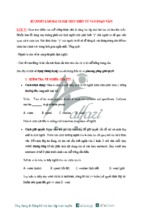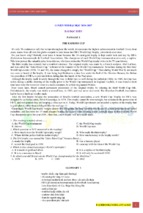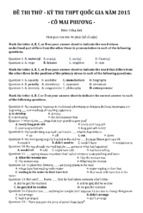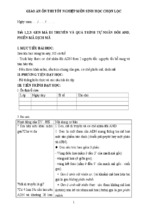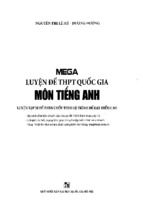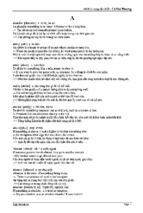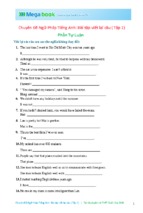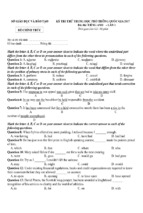ĐỀ
THI
THỬ
-‐
KỲ
THI
THPT
QUỐC
GIA
NĂM
2015
-‐
CÔ
MAI
PHƯƠNG
-‐
Môn:
Tiếng
Anh
Thời
gian
làm
bài:
90
phút
(kể
cả
luận)
Mark
the
letter
A,
B,
C,
or
D
on
your
answer
sheet
to
indicate
the
word
whose
underlined
part
differs
from
the
other
three
in
pronunciation
in
each
of
the
following
questions.
Question
1:
A.
material
B.
crucial
Question
2:
A.
reign
B.
leisure
C.
partial
C.
neighbor
D.
financial
D.
vein
Mark
the
letter
A,
B,
C,
or
D
on
your
answer
sheet
to
indicate
the
word
that
differs
from
the
other
three
in
the
position
of
the
primary
stress
in
each
of
the
following
questions.
Question
3:
A.
equality
B.
available
C.
manufacture
D.
biography
Question
4:
A.
penalty
B.
attendance
C.
opponent
D.
adventure
Question
5:
A.
intensity
B.
congratulate
C.
philosophy
D.
entrepreneur
Mark
the
letter
A,
B,
C
or
D
on
your
answer
sheet
to
indicate
the
correct
answer
to
each
of
the
following
questions.
Question
6:
As
consumers’
response
to
traditional
advertising
techniques
declines,
businesses
are
beginning
____
new
methods
of
reaching
customers.
A.
to
develop
B.
develop
C.
it
developing
D.
the
development
that
Question
7:
Where’s
the
____
dress
that
your
grandma
gave
you?
A.
lovely
long
pink
silk
B.
lovely
pink
long
silk
C.
pink
long
lovely
silk
D.
long
pink
silk
lovely
Question
8:
His
handwriting
is
so
bad
I
can’t
make
____
what
he
has
written.
A.
up
B.
off
C.
out
D.
down
Question
9:
We
were
going
to
go
by
bus
but
in
the
end
we
____
because
Simon
gave
us
a
lift.
A.
needn’t
B.
didn’t
need
to
C.
needn’t
have
D.
needed
not
to
Question
10:
He
was
already
worried
lest
she
____
someone
what
had
happened.
A.
would
tell
B.
told
C.
might
have
told
D.
had
been
telling
Question
11:
____
saying
was
so
important
that
I
asked
everyone
to
stop
talking
and
listen.
A.
What
the
woman
was
B.
That
the
woman
was
C.
The
woman
was
D.
What
was
the
woman
Question
12:
To
plant
rice,
farmers,
____,
set
young
plants
in
the
mud.
A.
whose
bare
feet
wading
in
the
water
B.
water
wading
in
their
feet
C.
wading
in
the
water
in
their
bare
feet
D.
they
wade
with
bare
feet
in
the
water
Question
13:
Not
until
____
home
____
that
he
had
taken
someone
else's
bike.
A.
did
he
get/he
realized
B.
did
he
get/did
he
realize
C.
he
got/did
he
realize
D.
he
got/he
realized
Question
14:
I’d
rather
you
____
anything
for
tonight,
but
I
suppose
it’s
too
late
to
change
things
now.
A.
not
arrange
B.
didn’t
arrange
C.
hadn’t
arranged
D.
don’t
arrange
Question
15:
-‐
“Have
you
seen
the
price
of
petrol
these
days?”
-‐
“____”
A.
I’m
amazing,
aren’t
I?
C.
It’s
amazing,
isn’t
it?
B.
Isn’t
it
great?
D.
What
a
lot
of
petrol?
Question
16:
_____,
they
slept
soundly.
A. Hot
though
was
the
night
air
B. Hot
though
the
night
air
was
C. Hot
the
night
air
as
was
D. Hot
although
the
nigh
air
was
Question
17:
-‐
"I
apologize
for
keeping
you
waiting
for
2
hours.
My
car
broke
down
on
the
way."
-‐
"____."
A.
Your
apology
is
accepted
B.
You
are
welcome
C.
Thank
you
D.
It's
my
pleasure
Question
18:
When
the
U.S.
and
England
proclaimed
war
against
Iraq,
the
anti
war
protesters
all
A.
set
up
around
the
world
____
practically
all
the
roads
to
the
famous
squares.
B.
took
over
C.
turned
over
D.
blocked
off
Question
19:
I
don't
think
this
record
will
ever
____.
A.
get
out
B.
run
off
C.
catch
on
D.
put
down
Question
20:
It
was
too
late
to
____
of
the
contract.
A.
back
up
B.
back
down
C.
back
out
D.
back
away
Question
21:
I’m
_____a
complete
loss
to
understand
why
you
reacted
so
violently
A. at
B. in
C. on
D. by
Question
22:
After
hours
of
bargaining
with
the
salesman,
Jake
bought
the
jacket
for
a_____
of
the
original
price.
A. fraction
B. piece
C. part
D. spot
Question
23:
Amelia
Earhart
____history
in1928
when
she
became
the
first
woman
to
fly
across
the
Atlantic
A. fixed
B. made
C. prepared
D. did
Question
24:
The
Avicenna
Partnership
is
a
______
company
with
a
long
and
successful
sales
history.
A. respectable
B. respectful
C. respecting
D. respective
Mark
the
letter
A,
B,
C
or
D
on
your
answer
sheet
to
indicate
the
word(s)
SIMILAR
in
meaning
to
the
underlined
word(s)
in
each
of
the
following
questions.
Question
25:
Living
in
the
central
Australian
desert
has
its
problems,
of
which
obtaining
water
is
not
the
least.
A.
getting
B.
storing
C.
purifying
D.
controlling
Question
26:
The
Industrial
Revolution
marked
the
beginning
of
an
epoch
of
exodus
from
rural
areas
to
cities.
A.
migration
B.
period
C.
episode
D.
story
Question
27:
The
government
is
subsidizing
the
ship
building
industry.
A.
ending
B.
creating
C.
aiding
D.
improving
Question
28:
We
had
to
list
the
chronology
of
events
in
World
War
II
on
our
test.
A.
disaster
B.
discrepancy
C.
catastrophe
D.
time
sequence
Question
29:
The
price
of
gasoline
fluctuates
daily.
A.
spin
out
of
control
B.
run
faster
C.
change
frequently
D.
disappear
Mark
the
letter
A,
B
C
or
D
on
your
answer
sheet
to
indicate
the
underlined
part
that
needs
correction
in
each
of
the
following
questions:
Question
30:
Digital
clocks,
however
precise,
they
cannot
be
perfectly
accurate
because
the
earth’s
A
B
C
rotation
changes
slightly
over
years.
C
Question
31:
At
the
Hermitage,
Andrew
Jackson’s
home
in
Tennessee,
even
his
glasses
have
been
left
exactly
where
he
lay
them.
Question
32:
The
officials
of
the
Board
of
Elections
asked
that
each
voter
present
their
registration
card
and
a
valid
Texas
driver’s
license
before
receiving
a
ballot.
Question
33:
Someone
who
has
ever
tried
to
pick
up
spilled
mercury
will
agree
that
this
element
is
hard
to
handle.
Question
34:
Jaguarundis
are
sleek,
long-‐tailed
creatures
colored
either
an
uniform
reddish
brown
or
dark
grey.
A.
long-‐tailed
B.
colored
C.
an
D.
or
Read
the
following
passage
and
mark
the
letter
A,
B,
C,
or
D
on
your
answer
sheet
to
indicate
the
correct
word
or
phrase
that
best
fits
each
of
the
numbered
blanks.
(35)
____
history,
women
have
always
aimed
for
a
recognized
place
in
(36)
____.
Guided
by
their
own
(37)
____
of
knowledge
and
expertise,
women
like
Marie
Curie
in
science,
Mary
Wollstonecraft
in
literary
writing,
Simone
de
Beauvois
in
philosophical
existentialist
debate,
and
Marie
Stopes
in
medicine,
to
name
a
few,
have
brought
about
(38)____
awareness
of
the
role
of
the
women
in
any
walks
of
life.
These
women
have
helped
redefine
and
(39)____
the
nature
of
women’s
place
in
society.
Today
the
(40)____
of
global
women’s
organizations
and
the
impact
of
women’s
contributions
(41)____
society
show
that
progress
has
been
made
and
the
progress
in
furthering
the
role
of
women
in
society
has
been
some
benefit
to
the
(42)____
woman.
It
is
true
to
say
that
not
all
women
have
the
same
need.
The
need
of
the
woman
who
stays
at
home
and
(43)____
children
will
differ
widely
from
the
woman
who
works
outside.
Nonetheless,
in
the
extensive
field
of
equal
opportunities,
it
would
be
good
to
know
that
access
is
given
to
both
with
equal
measure
according
to
the
true
value
of
respective
abilities.
It
also
would
be
good
to
know
that
the
woman
at
home
is
recognized
as
a
valued
(44)____
of
society
just
as
much
as
the
one
who
deals
on
business
outside
the
home.
Question
35:
A.
Among
B.
Throughout
C.
During
D.
Upon
Question
36:
A.
society
B.
social
C.
socialize
D.
socialist
Question
37:
A.
region
B.
farm
C.
field
D.
path
Question
38:
A.
a
B.
an
C.
the
D.
(no
article)
Question
39:
A.
gain
B.
encourage
C.
force
D.
consolidate
Question
40:
A.
right
B.
belief
C.
limit
D.
spread
Question
41:
A.
on
B.
for
C.
to
D.
at
Question
42:
A.
own
B.
private
C.
individual
D.
personal
Question
43:
A.
rises
B.
raises
C.
increases
D.
lift
Question
44:
A.
party
B.
competitor
C.
partner
D.
member
Read
the
following
passage
and
mark
the
letter
A,
B,
C
or
D
on
your
answer
sheet
to
indicate
the
correct
answer
to
each
of
the
questions
from
45
to
54.
Line
1
5
10
15
20
25
Music
can
bring
us
to
tears
or
to
our
feet,
drive
us
into
battle
or
lull
us
to
sleep.
Music
is
indeed
remarkable
in
its
power
over
all
humankind,
and
perhaps
for
that
every
reason,
no
human
culture
on
earth
has
ever
lived
without
it.
From
discoveries
made
in
France
and
Slovenia
even
Neanderthal
man,
as
long
as
53,000
years
ago,
had
developed
surprisingly
sophisticated,
sweet-‐sounding
flutes
carved
from
animal
bones.
It
is
perhaps
then,
no
accident
that
music
should
strike
such
a
chord
with
the
limbic
system
–
an
ancient
part
of
our
brain,
evolutionarily
speaking,
and
one
that
we
share
with
much
of
the
animal
kingdom.
Some
researchers
even
propose
that
music
came
into
this
world
long
before
the
human
race
ever
did.
For
example,
the
fact
that
whale
and
human
music
have
so
much
in
common
even
though
our
evolutionary
paths
have
not
interested
for
nearly
60
million
years
suggests
that
music
may
predate
humans.
They
assert
that
rather
than
being
the
inventors
of
music,
we
are
latecomers
to
the
musical
scene.
Humpback
whale
composers
employ
many
of
the
same
tricks
that
human
songwriters
do.
In
addition
to
using
similar
rhythms,
humpbacks
keep
musical
phrases
to
a
few
seconds,
creating
themes
out
of
several
phrases
before
singing
the
next
one.
Whale
songs
in
general
are
no
longer
than
symphony
movements,
perhaps
because
they
have
a
similar
attention
span.
Even
though
they
can
sing
over
a
range
of
seven
octaves,
the
whales
typically
sing
in
key,
spreading
adjacent
notes
no
farther
apart
than
a
scale.
They
mix
percussive
and
pure
tones
in
pretty
much
the
same
ratios
as
human
composers
–
and
follow
their
ABA
form,
in
which
a
theme
is
presented,
elaborated
on
and
then
revisited
in
a
slightly
modified
form.
Perhaps
most
amazing,
humpback
whale
songs
include
repeating
refrains
that
rhyme.
It
has
been
suggested
that
whales
might
use
rhymes
for
exactly
the
same
reasons
that
we
do:
as
devices
to
help
them
remember.
Whale
songs
can
also
be
rather
catchy.
When
a
few
humpbacks
from
the
Indian
Ocean
strayed
into
the
Pacific,
some
of
the
whales
they
met
there
quickly
changed
their
tunes
–
singing
the
new
whales’
songs
within
three
short
years.
Some
scientists
are
even
tempted
to
speculate
that
a
universal
music
awaits
discovery.
Question
45:
Why
did
the
author
write
the
passage?
A.
To
describe
the
music
for
some
animals,
including
humans
B.
To
illustrate
the
importance
of
music
to
whales
C.
To
show
that
music
is
not
a
human
or
even
modern
invention
D.
To
suggest
that
music
is
independent
of
life
forms
that
use
it
Question
46:
The
word
“sophisticated”
in
line
5
is
closest
in
meaning
to:
A.
compound
B.
attractive
C.
well-‐
developed
D.
beautiful
Question
47:
The
word
“one”
in
line
7
can
be
replaced
by:
A.
the
chord
B.
the
left
brain
C.
the
right
brain
D.
the
limbic
system
Question
48:
According
to
the
passage,
which
of
the
following
is
true
of
humpback
whales?
A.
Their
tunes
are
distinctively
different
from
human
tunes.
B.
They
can
sing
over
a
range
of
seven
octaves.
C.
They
do
not
use
rhyme,
unlike
humans.
D.
Whale
songs
of
a
particular
group
cannot
be
learned
by
other
whales.
Question
49:
The
word
“They”
in
line
18
refers
to:
A.
human
composers
B.
whole
songs
C.
octaves
D.
whales
Question
50:
Which
of
the
following
is
NOT
true
about
humpback
whale
music?
A.
It
uses
similar
patterns
to
human
songs.
B.
It’s
comparative
in
length
to
symphony
movements.
C.
It’s
easy
to
learn
by
other
whales.
D.
It’s
in
a
form
of
creating
a
theme,
elaborating
and
revisiting
in
rhyming
refrains.
Question
51:
The
word
“catchy”
in
line
24
is
closest
in
meaning
to:
A.
easy
to
catch
B.
easy
to
remember
C.
easy
to
read
D.
easy
to
think
Question
52:
Which
of
the
following
can
be
inferred
from
the
passage?
A.
The
earliest
human
beings
came
from
France
and
Slovenia.
B.
Music
helped
to
shape
the
whale
brain.
C.
Humpback
whales
imitate
the
way
human
composers
so
in
creating
their
own
music.
D.
The
research
of
musical
brain
will
lead
to
a
discovery
of
a
universal
music.
Question
53:
Where
in
the
passage
does
the
author
first
mention
whales?
A.
Lines
5-‐9
B.
Lines
10-‐14
C.
Lines
15-‐19
D.
Lines
20-‐24
Question
54:
The
word
‘their”
in
line
25
refers
to:
A.
Indian
Ocean
humpbacks
B.
Pacific
Ocean
humpbacks
C.
all
whales
D.
whale
songs
Read
the
following
passage
and
mark
the
letter
A,
B,
C
or
D
on
your
answer
sheet
to
indicate
the
correct
answer
to
each
of
the
questions
from
55
to
64.
The
food
we
eat
seems
to
have
profound
effects
on
our
health.
Although
science
has
made
enormous
steps
in
making
food
more
fit
to
eat,
it
has,
at
the
same
time,
made
many
foods
unfit
to
eat.
Some
research
has
shown
that
perhaps
eighty
percent
of
all
human
illnesses
are
related
to
diet
and
forty
percent
of
cancer
is
related
to
the
diet
as
well.,
especially
cancer
of
the
colon.
People
of
different
cultures
are
more
prone
to
contract
certain
illnesses
because
of
the
characteristic
foods
they
consume.
That
food
is
related
to
illness
is
not
a
new
discovery.
In
1945,
government
researchers
realized
that
nitrates
and
nitrites
(commonly
used
to
preserve
color
in
meat)
as
well
as
other
food
additives
caused
cancer.
Yet,
these
carcinogenic
additives
remain
in
our
food,
and
it
becomes
more
difficult
all
the
time
to
know
which
ingredients
on
the
packaging
labels
of
processed
food
are
helpful
or
harmful.
The
additives
that
we
eat
are
not
all
so
direct.
Farmers
often
give
penicillin
to
cattle
and
poultry,
and
because
of
this,
penicillin
has
been
found
in
the
milk
of
treated
cows.
Sometimes
similar
drugs
are
administered
to
animals
not
for
medicinal
purposes,
but
for
financial
reasons.
The
farmers
are
simply
trying
to
fatten
the
animals
in
order
to
obtain
a
higher
price
on
the
market.
Although
the
Food
and
Drug
Administration
(FDA)
has
tried
repeatedly
to
control
these
procedures,
the
practices
continue.
A
healthy
diet
is
directly
related
to
good
health.
Often
we
are
unaware
of
detrimental
substances
we
ingest.
Sometimes
well-‐meaning
farmers
or
others
who
do
not
realize
the
consequences
add
these
substances
to
food
without
our
knowledge.
Question
55.
How
has
science
done
a
disservice
to
people?
A:
The
scientists
have
preserved
the
color
of
meats,
but
not
of
vegetables.
B:
It
caused
a
lack
of
information
concerning
the
value
of
food.
C:
As
a
result
of
scientific
intervention,
some
potentially
harmful
substances
have
been
added
to
our
food
D:
Because
of
science,
disease
caused
by
contaminated
food
has
been
virtually
eradicated.
Question
56.
The
word
“prone”
is
nearest
in
meaning
to
______.
A:
healthy
B:
predisposed
C:
supine
D:
unlikely
Question
57.
What
are
nitrates
used
for?
A:
They
preserve
the
colour
of
meat.
B:
They
preserve
flavor
in
packaged
foods.
C:
They
are
the
objects
of
research.
D:
They
cause
the
animals
to
become
fatter.
Question
58.
FDA
means
______.
A:
Federal
Dairy
Additives
B:
Final
Difficult
Analysis
C:
Food
Direct
Additives
D:
Food
and
Drug
Administration
Question
59.
The
word
“these”
refers
to
______.
A:
nitrates
and
nitrites
B:
researchers
C:
meats
D:
colors
Question
60.
The
word
“carcinogenic”
is
closest
in
meaning
to
______.
A:
cancer-‐causing
B:
trouble-‐making
C:
money-‐making
D:
color-‐
retaining
Question
61.
All
of
the
following
statements
are
TRUE
except
______.
A:
Researchers
have
known
about
the
potential
hazards
of
food
additives
for
more
than
forty-‐
five
years
B:
Drugs
are
always
given
to
animals
for
medical
reasons
C:
Some
of
the
additives
in
our
food
are
added
to
the
food
itself
and
some
are
given
to
the
living
animals
D:
Food
may
cause
forty
percent
of
the
cancer
in
the
world
Question
62.
The
word
“additives”
is
closest
in
meaning
to
______.
A:
benign
substances
B:
added
substances
C:
natural
substances
D:
dangerous
substances
Question
63.
What
is
the
best
title
for
this
passage?
A:
Harmful
and
Harmless
Substances
in
Food.
B:
Avoiding
Injurious
Substances
in
Food.
C:
The
Food
You
Eat
Can
Affect
Your
Health.
D:
Improving
Health
through
a
Natural
Diet.
Question
64.
The
word
“
fit”
is
closest
in
meaning
to
______.
A:
tasty
B:
suitable
C:
athletic
D:
adaptable
WRITING
Part
I.
Finish
each
of
the
following
sentences
in
such
a
way
that
it
means
the
same
as
the
sentence
printed
before
it.
Question
65:
I
was
astonished
by
her
confidence.
à
What
astonished
me
was
her
confidence.
Question
66:
I
don’t
really
like
her,
even
though
I
admire
her
achievements.
à
Much
as
I
admire
her
achievement,
I
don’t
really
like
her.
Question
67:
He
speaks
more
persuasively
than
his
brother.
à
He
is
a
more
persuasive
speaker
than
his
brother.
Question
68:
The
only
way
to
eliminate
world
terrorism
is
by
united
opposition.
à
Only
by
united
opposition,
can
we
eliminate
world
terrorism.
Question
69:
Someone
has
stolen
the
boss’s
car.
à
The
boss
has
had
his
car
stolen/
been
robbed
of
his
car.
Part
II.
In
about
140
words,
write
a
paragraph
about
an
important
person
in
your
life.
- Xem thêm -

